Facebook Pixel receives and processes conversion events differently since Apple released iOS 14. Now, Apple's mobile apps must have opt-in-for-tracking requests for its iOS 14 users.
The update limits user information exchange with Facebook, thereby prohibiting specific user data collection and sharing. The result has been a rise in costs and attribution issues. It will affect Facebook advertisers who run Facebook ads, track web conversion events (form submissions, clicks, etc. ), advertise mobile apps, and optimize Facebook ads.
Facebook Ads optimization is difficult due to the lack of tracking of user activity. Due to this, your ads may not deliver the results you expect. When it comes to Facebook Ads, it's vital to have a clear understanding of what your industry's benchmarks are. Setting goals and limits will help you stay on track.
You can use the Facebook metrics averages in this article to better plan your campaigns.
Benchmarks for Facebook Ads performance by industry
These are the latest benchmarks for Facebook advertising in four key metrics:
-
Click-through rate
-
Cost per click
-
Conversion rate
-
Cost per action
The following industries use Facebook metric data: Auto, Apparel, Beauty, B2B, Education, Consumer Services, Employment & Job Training, Fitness, Finance & Insurance, Healthcare, Home Improvement, Industrial Services, Legal, Retail, Real Estate, Travel & Hospitality, and Technology.
1. Click-through rate on Facebook by industry
Overall 18 industries, Facebook Ads average 0.90 percent CTR.
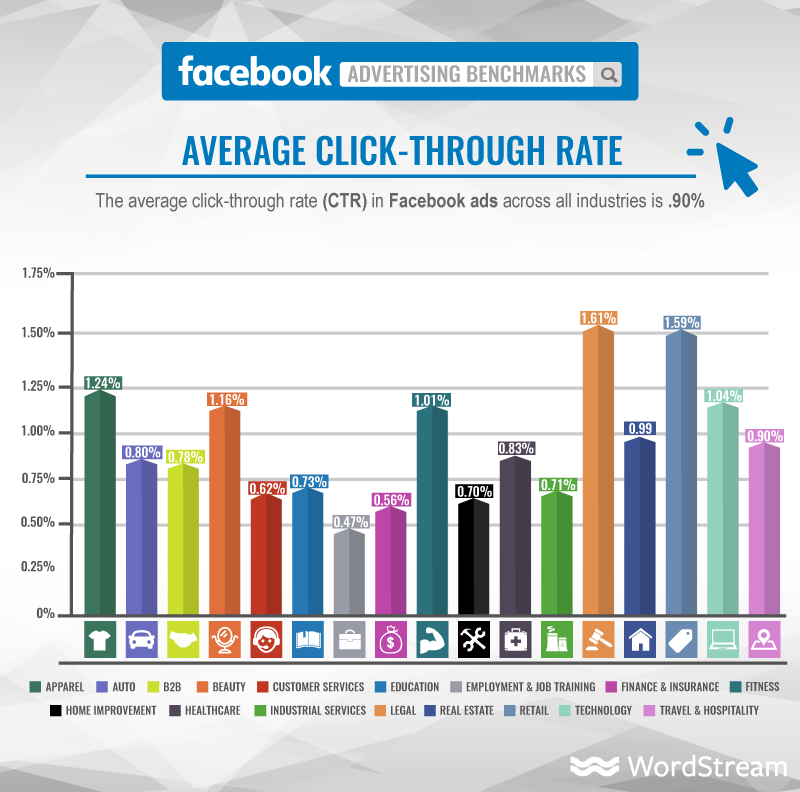
Industry click-through rate (Figure 1).
SERPs are not conducive to legal advertising, but Facebook is much more effective. All 18 industries have varying CTRs, but legal advertisers have the highest. When your ad appears among several other ads on SERPs, it can be challenging to impress potential clients. In a prospect's feed, legal ads stand out with a clear USP and enticing CTA.
Facebook ads in the following industries receive a high CTR:
-
1.59 percent in retail
-
list item1.24 percent - Apparel
-
1.16 percent of the population is beautiful
-
list item1.04 percent of the economy is devoted to technology
-
list itemFitness – 1.01 percent
There's no surprise that these industries' ads perform better on Facebook since they typically feature models and great visuals. The high CTR is also due to the frequent sales and promotions offered by these industries.
Employment & job services have the lowest click-through rate at 0.47 percent. It may not be the best network for job seekers, and advertisers should consider other platforms, such as LinkedIn. Finance & Insurance (0.56 percent), Customer Services (0.62 percent), and Home Improvement (0.70 percent) follow closely behind.
2. Average cost per click on Facebook
In all industries, Facebook costs $1.72 per click on average.
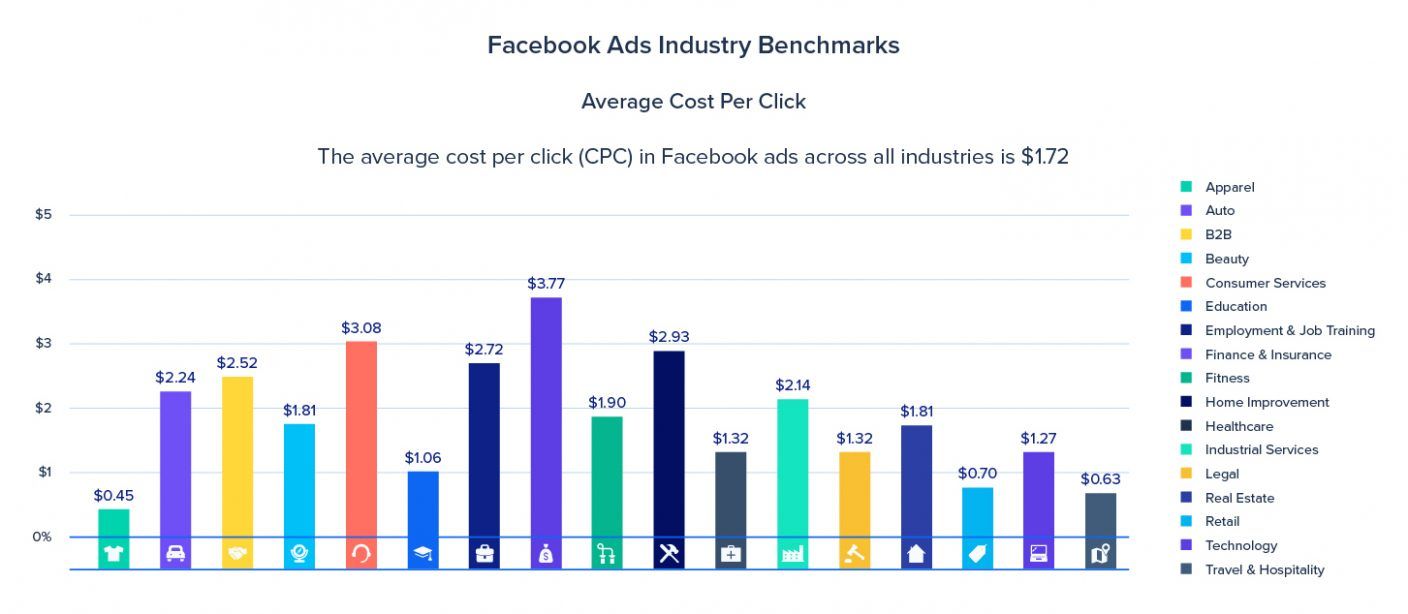
Figure 2 shows the average cost per click by industry.
Finance has the highest CPC on Facebook. Financial advertisers pay more for clicks on their ads than advertisers in other industries, at $3.77 per click. In spite of this, they are fairly satisfied with their search results on Facebook, as terms like "Loans," "Mortgages," and "Insurance" are some of the most expensive keywords on search.
It appears that marketers in the financial industry are paying too much for very few clicks on Facebook, due to a low CTR of just 0.56 percent.
Facebook Ads in the following industries have a high CPC:
-
Services to consumers - $3.08
-
$2.93 for home improvement
-
B2B – $2.52
-
Auto – $2.24
Advertisers in the apparel ($0.45), travel & hospitality ($0.63), and retail ($0.70) businesses pay the lowest CPCs. Clicks in these sectors are very reasonably priced, costing less than a dollar, enabling advertisers to execute big campaigns. You should keep in mind, nevertheless, that these industries have significant click-through rates. So that your advertising costs don't spiral out of control, you should be able to manage your budget effectively.
3. Average conversion rates on Facebook
In comparison to Google Ads, Facebook Ads have a better average conversion rate (9.21%) across all industries.
For the purposes of this analysis, only Facebook ad campaigns with the conversion target were taken into account.
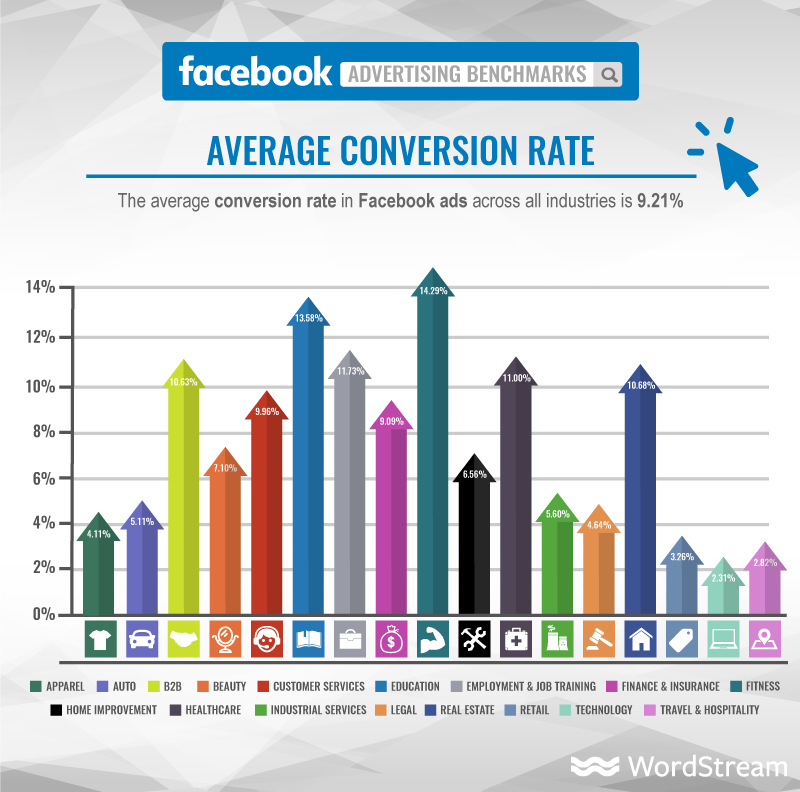
Figure 3 shows the typical conversion rate by sector. Author: WordStream
Facebook advertising with fitness-related content converted more frequently than other ads on the network. Facebook advertisements are successful in connecting fitness advertisers with motivated prospects, with a conversion rate of 14.29%.
When using Facebook ads, some sectors with strong conversion rates are:
-
- 13.58 percent in education
-
Workforce development and employment: 11.73 percent
-
healthcare - 11.0 %
-
Property - 10.68 percent
-
B2B: 10.63 percent
However, these statistics are intriguing when taking into account the respective CTRs. For instance, the job and training sector has one of the lowest CTRs, but when consumers click on the advertising, they convert at a far greater percentage. Similar to this, fitness-related Facebook advertising had the highest conversion rate across all industries, despite having the fifth-highest CTR (1.01 percent). This might be because people who click on fitness advertisements are highly motivated. They are aware of what they want and hold off on clicking the adverts until they are prepared to take action.
Unfortunately, a lot of industries perform far worse than average on Facebook. At 3.26 percent, 2.82 percent, and 2.31 percent, respectively, the conversion rates for the retail, travel & hospitality, and IT sectors are incredibly low. These sectors might not gain much from Facebook's lead generation advertisements, but they can increase conversion rates and interact with prospects by using remarketing techniques.
Another thing to keep in mind is that although technology advertising has the lowest conversion rates (1.04 percent CTR), they do have the highest CTR (1.04 percent) (2.31 percent). This is most likely due to the fact that advertisers haven't optimized their landing pages for conversion, which has led to a low CVR when customers research their options for technical services.
4. Average cost per action on Facebook by industry
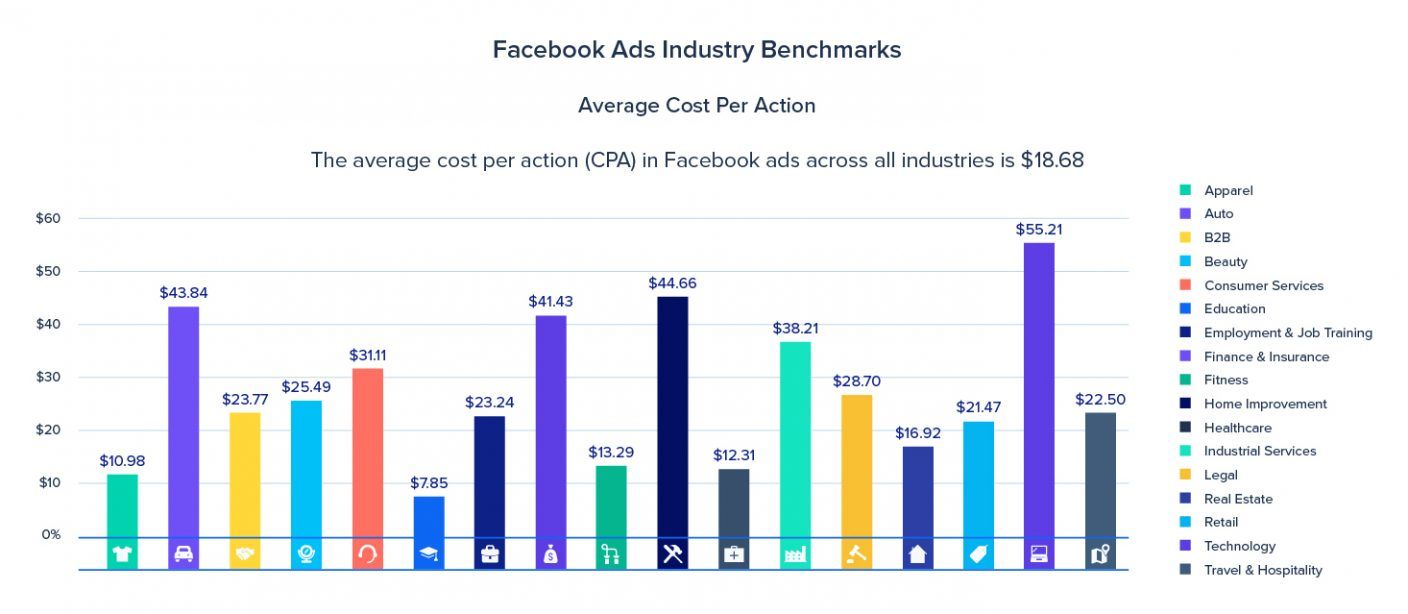
All sectors combined, the average CPA for Facebook advertisements is $18.68. Based on the particular objectives of the marketers, such as sales, providing contact information, placing a call, submitting a form, etc., the activities differed for this study.
Education marketers pay the least for the actions that are generated by their advertising, with a CPA of $7.85. As a result, it makes sense for education firms to advertise their services on Facebook in order to reach the platform's primarily young user base.
The following sectors also have low costs per action:
-
Clothing: $10.98
-
Medical - $12.31
-
Property - $16.92
While Facebook is a terrific resource for connecting with kids, finding a car, an architect, and IT services can be expensive. Advertising in the auto sector costs $43.84 on average per action, whereas advertising in the home improvement and IT services sectors costs $44.66 and $55.21, respectively. However, these sectors have relatively high lifetime values for new clients, which ultimately makes hiring CPAs beneficial.
User intent is one of the factors contributing to the high CPA in the technology sector. Remember that Facebook is a social network and that most users connect with friends and family there rather than looking for technical jobs.
You must comprehend your audience in order to make sure that your adverts speak to them in order to attain a reduced CPA. To compel your target audience to act, your adverts must also properly convey your exclusive offer. Improve your ad design and targeting choices by working with a growth marketing firm.
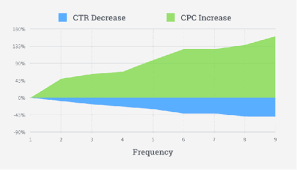
Because they provide advertisers in practically every industry chances, Facebook Ads have garnered a lot of followers. With Facebook's sophisticated targeting capabilities, you may reach the ideal demographic and dazzle them with your offers.
You can tell if you're getting the most out of your advertising by looking at the FB Ads benchmarks we've mentioned above. If you find that you fall short of these criteria, it just implies that you have room to do better. With some work, you'll outperform your sector averages and bring in additional clients for your company. If you have observed many changes in the benchmarks while running your campaigns, please let us know in the comments area.